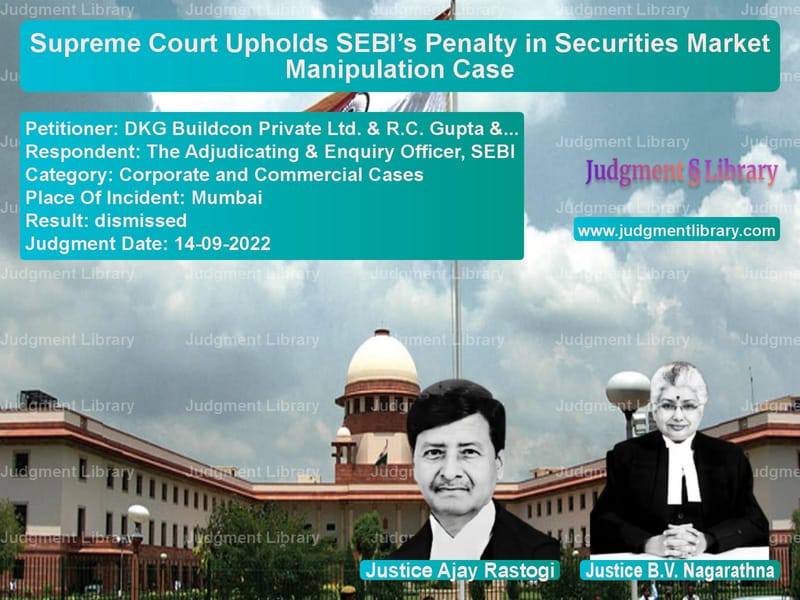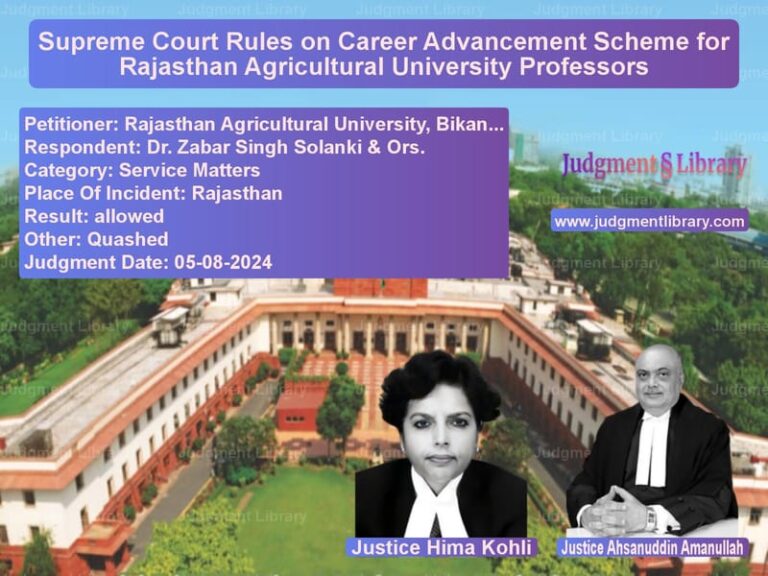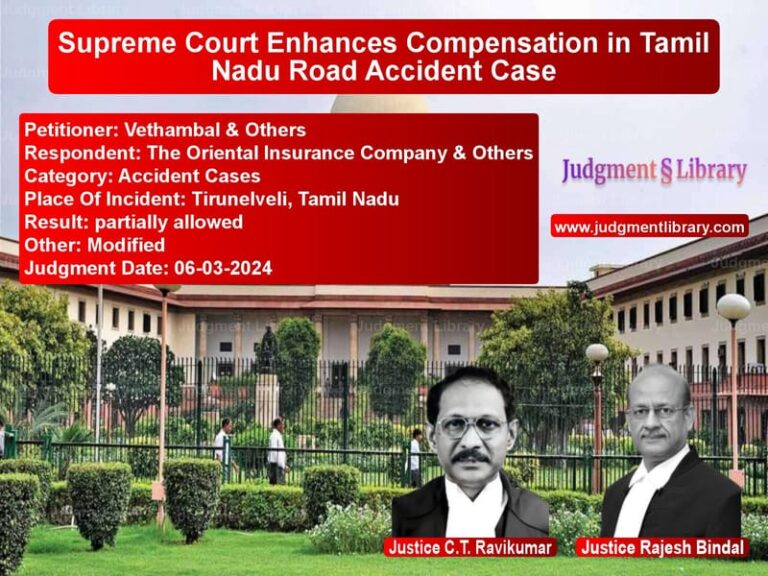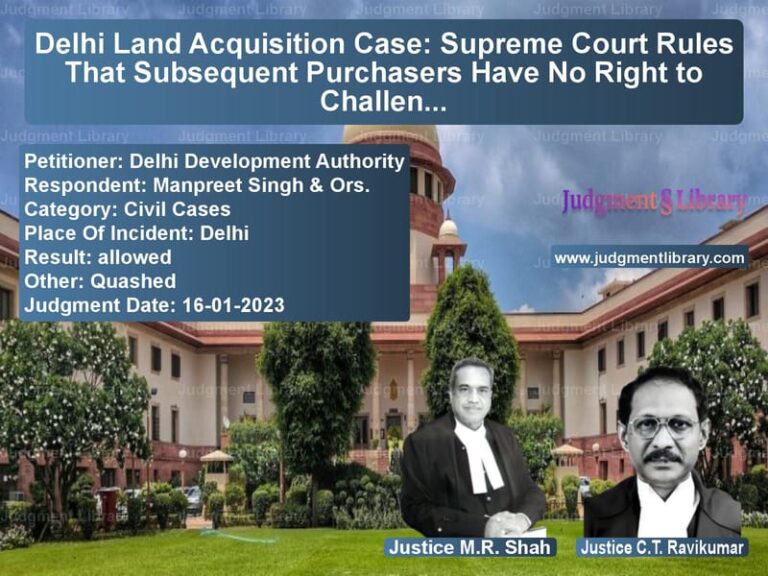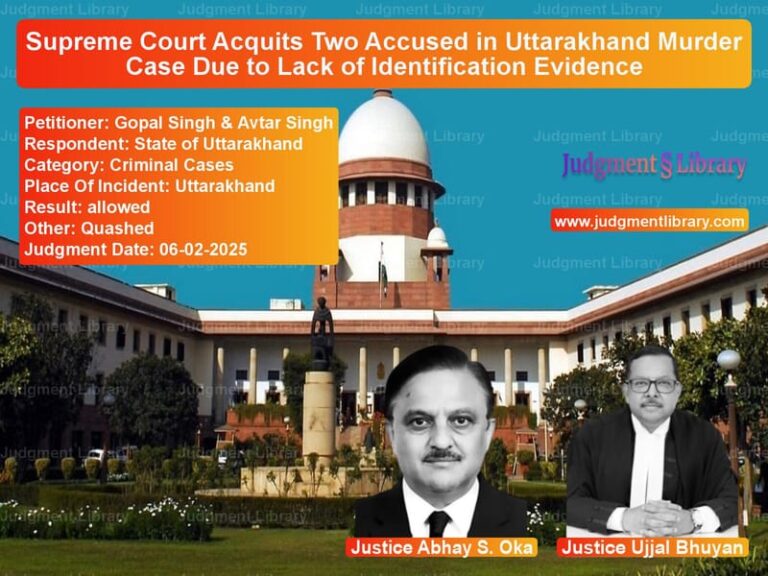Supreme Court Upholds SEBI’s Penalty in Securities Market Manipulation Case
The Supreme Court of India recently delivered a significant judgment in the case of DKG Buildcon Private Ltd. & R.C. Gupta & Co. Pvt. Ltd. vs. The Adjudicating & Enquiry Officer, SEBI, reaffirming the Securities and Exchange Board of India’s (SEBI) authority to penalize entities for non-compliance with investigation procedures. The case involved allegations of market manipulation in the shares of Shonkh Technology International Ltd. (STIL) and SEBI’s actions against the appellants for failing to furnish critical information during its probe.
Background of the Case
The matter originated from an investigation conducted by SEBI into unusual price movements in the shares of STIL. SEBI found that entities connected to market operator Ketan Parekh were involved in manipulating stock prices by acquiring and transferring shares through various intermediaries. The appellants, DKG Buildcon Private Ltd. and R.C. Gupta & Co. Pvt. Ltd., were among the entities that had acquired shares of STIL and later transferred them to companies controlled by Parekh.
SEBI suspected that these transfers were part of a larger scheme to create artificial trading volumes in STIL shares. Consequently, it issued multiple summonses to the appellants, demanding details regarding their transactions, directorships, and financial dealings.
Key Developments
- SEBI issued a letter on July 2, 2001, requesting details from DKG Buildcon regarding its shareholding in STIL and its transactions.
- Multiple summonses were sent between 2001 and 2003, instructing the appellants to provide information and appear before SEBI officials.
- The appellants either failed to respond or sought repeated adjournments, delaying the investigation.
- Due to non-compliance, SEBI initiated adjudication proceedings and imposed a penalty of Rs. 1 crore on each appellant under Section 15A(a) of the SEBI Act.
- The Securities Appellate Tribunal (SAT) upheld SEBI’s penalty, prompting the appellants to approach the Supreme Court.
Legal Arguments
Arguments by the Appellants
- The appellants contended that the penalty of Rs. 1 crore was excessive and disproportionate to their alleged offense.
- They argued that SEBI had no jurisdiction to summon them as they were not directly involved in securities market manipulation.
- They claimed that they had already responded to SEBI’s initial inquiries and were under the impression that no further action was required.
- The appellants also contended that the enhanced penalty under the amended Section 15A(a) of the SEBI Act should not apply retrospectively.
Arguments by SEBI
- SEBI maintained that the appellants had repeatedly evaded investigation by failing to respond to summonses issued between 2001 and 2003.
- It emphasized that the entities had assisted Ketan Parekh in stock market manipulation, making their cooperation in the probe essential.
- SEBI asserted that under Section 11C of the SEBI Act, it had the authority to summon any person associated with the securities market for investigation.
- The regulatory body argued that the penalty was necessary to deter other entities from obstructing investigations into market frauds.
Supreme Court’s Observations
A bench comprising Justice Ajay Rastogi and Justice B.V. Nagarathna examined the legal and factual aspects of the case before making the following key observations:
1. Failure to Comply with SEBI Summons is a Serious Offense
The Court noted that the appellants had continuously ignored summonses and did not provide essential information. It observed:
“Failure to comply with SEBI’s summons obstructs market investigations and compromises investor protection. Such actions must attract strict penalties to ensure compliance.”
2. SEBI’s Investigatory Powers are Well-Defined
The Court upheld SEBI’s authority under Section 11C(3) to summon individuals and entities associated with the securities market. It clarified that any entity involved in shareholding transactions could be questioned.
3. The Penalty was Justified
The Supreme Court ruled that the penalty imposed was in line with the law. It pointed out:
“The penalty of Rs. 1 crore is justified given the deliberate non-compliance and the impact on the market investigation. The appellants’ conduct was aimed at frustrating the probe.”
4. No Retrospective Application of Law
Addressing the contention that the amended penalty provision should not apply, the Court clarified that the penalty was imposed based on the appellants’ latest violation, which occurred after the amendment came into effect.
Final Verdict
The Supreme Court dismissed the appeals and ruled as follows:
- The penalty of Rs. 1 crore on each appellant was upheld.
- The appellants’ failure to comply with SEBI’s investigation warranted strict action.
- The ruling reinforced the importance of regulatory compliance in the securities market.
Impact of the Judgment
This judgment has significant implications for financial market regulation:
- It strengthens SEBI’s authority to investigate market manipulations and enforce compliance.
- It sets a precedent that entities cannot evade investigation by ignoring summonses.
- It upholds the principle that regulatory bodies must have the power to impose deterrent penalties for non-cooperation.
Conclusion
The Supreme Court’s ruling in DKG Buildcon vs. SEBI reinforces the importance of compliance with regulatory investigations in the securities market. The judgment serves as a stern warning to entities attempting to obstruct investigations, ensuring that SEBI retains its ability to safeguard investor interests and maintain market integrity.
Petitioner Name: DKG Buildcon Private Ltd. & R.C. Gupta & Co. Pvt. Ltd..Respondent Name: The Adjudicating & Enquiry Officer, SEBI.Judgment By: Justice Ajay Rastogi, Justice B.V. Nagarathna.Place Of Incident: Mumbai.Judgment Date: 14-09-2022.
Don’t miss out on the full details! Download the complete judgment in PDF format below and gain valuable insights instantly!
Download Judgment: dkg-buildcon-private-vs-the-adjudicating-&-e-supreme-court-of-india-judgment-dated-14-09-2022.pdf
Directly Download Judgment: Directly download this Judgment
See all petitions in Corporate Compliance
See all petitions in unfair trade practices
See all petitions in Bankruptcy and Insolvency
See all petitions in Judgment by Ajay Rastogi
See all petitions in Judgment by B.V. Nagarathna
See all petitions in dismissed
See all petitions in supreme court of India judgments September 2022
See all petitions in 2022 judgments
See all posts in Corporate and Commercial Cases Category
See all allowed petitions in Corporate and Commercial Cases Category
See all Dismissed petitions in Corporate and Commercial Cases Category
See all partially allowed petitions in Corporate and Commercial Cases Category

